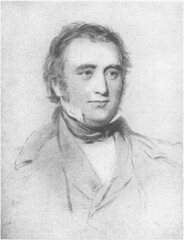 |
| Thomas Macaulay |
Thomas Macaulay arrived in India on June 10, 1834, the same time Charles Darwin sailed the Pacific Ocean on HMS Beagle and one of his first acts as the legal member of the education council was his Minute, that famous document, which defended the views of the Anglicists.
Macaulay was of the opinion that there was no point in perfecting the vernaculars, since there was nothing intelligent, but falsehood in them. In his Minute, he noted that he had no knowledge of Sanskrit or Arabic, but was convinced that a single shelf of a good European library was worth the whole native literature of India and Arabia. On the other hand, whoever learned English had access to the vast intellectual wealth of the wisest nations of the earth and the literature available in English is valuable that the literature of all languages of the world together.
Macaulay did not think that it was British duty to educate the lower classes directly. His goal was to teach the educated class, create what he called “enlightened natives” and get them to diffuse the knowledge to their countrymen. He wanted to combine vernacular with English instruction whenever possible since English language was the avenue by which people of India would arrive at all valuable knowledge. With English, the enlightened native would have access to accurate information on all subjects and could make considerable advances in life.
A line in the 1813 Charter Act read that a sum should be set apart “for the revival and promotion of literature and the encouragement of the learned natives of India”. Macaulay went Bill Clintonisque on the language of the Charter and argued that literature did not mean Sanskrit and Arabic and a learned native did not mean a person who studied all usages of cusa-grass and mysteries of absorption into the Deity from Hindu sacred books. In his Minute he made it clear that the Governor-General was free not to encourage Sanskrit and Arabic.
The reason for not attacking the vernaculars and just the Oriental languages was due to economics and the British did not have the resources to cover the whole country. The task of educating Indians was very daunting in terms of money, people and the geographical area that had to be covered. The cheaper solution was to educate the elite and let the education trickle down to the masses and since the educated elite spoke the Oriental languages, there was a need to replace it. In a testimony before a Select Committee of the House of Lords, Trevelyan testified that after Persian was dropped as an official language, it just disappeared and the Anglicists hoped that such would be the fate of Sanskrit and Arabic.
Macaulay was of the opinion that heathenism was “more cruel, more licentious, more fruitful of absurd right and pernicious laws” and that majority of the people of India were “idolaters, blindly attached to the doctrines and rites..” Brahminical mythology was absurd and was irrational superstition. If Christianity was not introduced to the heathens it would be “to commit high treason against humanity and civilization”
Macaulay firmly believed that knowledge of Western science, geography and history would cause the end of the Eastern religions. He was sure that a Brahmin who learned geography would smile at Hindu mythology. His biographer John Clive argues that Macaulay was not really concerned about the triumph of Christianity over idolatry, but over civilization over barbarism.
In his dissent against the Minute, Orientalist Henry Thoby Prinsep noted that the framers of the Charter Act of 1813 had native literature in mind when they mentioned literature. Macaulay argued that such interpretation was illogical for which Prinsep wrote curtly that he was not overwhelmed by Macaulay’s authority. Prinsep argued that the highest point of knowledge, similar to the philosophy of Bacon, Locke and Newton had been reached in both Sanskrit and Arabic and there was no point in teaching the same topics in another language and this assertion shocked the establishment and the response came not from Macaulay, but another council member as “Monstrous assertion!”.
Macaulay, to give more credibility to his decision, noted that students at the Calcutta Madrassa were being given stipends for studying Arabic while they willingly paid for studying English. He also mentioned a petition by ex-students of the Sanskrit college who mentioned that they were jobless after giving up a good part of their life in learning something which did not get them food and that there was no demand for Arabic and Sanskrit books which the committee had printed at great cost. Under pressure from Prinsep, Macaulay finally agreed that he may have committed a mistake or two in details in the Minute, but he would not step back from a single position he advanced.
We will look at the consequences of Macaulay’s Minute in the concluding part tomorrow.
See Also: The Story behind Macaulay’s Education Policy: Part 1, Macaulay’s Education Part 2: Religious Intolerance
Excellent series jk. You should be an history professor
Kuttan, if only someone paid me lot of money for it 🙂